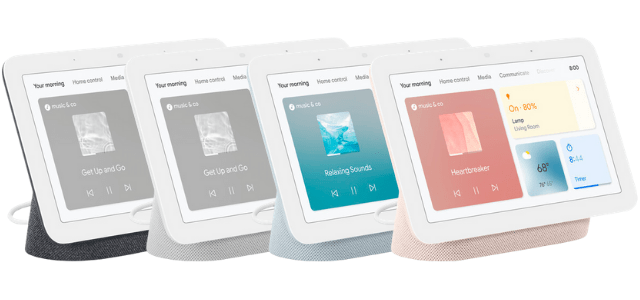
UK Grocery Inflation Eases to 5% in August 2025
UK grocery inflation eases to 5% in August 2025, showing slight relief. Consumers shift to value shopping as branded items rise and dining out declines.

In recent years, portable smart devices like Nest Hub have made their way in technology and growing markets. Smart screen devices are the following new evolution in this space, and this evolution is expanding at a tremendous rate. These devices offer the same feature as smart speakers, but the addition of screens allows them to give a more visual context to responses while opening additional applications.
Like the Amazon Echo Show with its giant 10-inch screen and little brother Echo Show 5, many smart devices with screens are already on the market. Some devices are positioned as digital watches, such as the 4-inch Lenovo Smart Clock and Amazon Echo Spot. All of these devices perform more or less similar functions, but the Google Nest Hub has something else to put on the table for its customers.
Google’s latest version of the Nest Hub, a 7-inch smart screen, will be paired with Google’s latest sleep sensitivity technology for its customers. The company claims to have perfected the technology by studying 15,000 people who sleep during a combined 110,000 nights. But the latest Nest Hub may also announce a new trick. If you enable it, the device will also monitor the ways of sleeping outside the bed, denying the need to carry a fitness device or other potentially annoying device in bed.
The feature, which Google intends to offer for free at least this year, relies on a new chip called that Google calls Soli, which uses radar to detect movement, including the depth of a person’s breathing.
Sleep Sensing uses Motion Sense to track the sleep of the person closest to the screen. With low-energy motion radar, Motion Sense detects movement and breathing. Other sensors in the Nest Hub detect sounds such as coughing, snoring, and environmental factors such as light and room temperature. In this way, Sensing Sleep determines when you went to bed and how long you slept, and the quality of your sleep.
Nest Hub will be able to generate weekly sleep reports with easily understandable breakdowns or problems in sleep duration and quality, how often the user gets up at night, and the frequency of snoring and coughing, along with tips developed in consultation with the American Academy of Sleep Medicine.
People with difficulty sleeping may find this new feature next to their ally. Still, this new addition in Google’s ever-expanding technology could lead to a particular concern on privacy, given Google’s long history of online surveillance to collect personal information, such as interests, habits, and location, to help sell the digital ads that generate most of its revenue.

UK grocery inflation eases to 5% in August 2025, showing slight relief. Consumers shift to value shopping as branded items rise and dining out declines.

Zelenskiy–Trump summit boosts markets as equities rise and the dollar steadies amid growing peace hopes. Investors await Fed insights at Jackson Hole for further direction.

Statistics Canada is investigating an accidental early release of June manufacturing data, raising concerns over data governance and market integrity. The agency has launched an internal review to strengthen its publishing protocols.

Investor confidence in France is deteriorating as political gridlock and budgetary uncertainty deepen.

June 09, 2025: Canada will host the 50th G7 Summit from June 15 to 17 in Kananaskis, Alberta, amid heightened global tensions and economic rifts.

May 30, 2025: Canada’s economy expanded at an annualized rate of 2.2% in the first quarter of 2025, outperforming the market forecast of 1.7%.

At seventeen, Professor Richard Rose stepped into a world few adults dare to navigate: the world of children fractured by trauma. He wasn’t a clinician then, nor a scholar. He was simply a young man with a heart tuned to the quiet ache of others.

Following a distinguished Law Enforcement career Joe McGee founded The Securitatem Group to provide contemporary global operational specialist security and specialist security training products and services for private clients, corporate organisations, and Government bodies. They deliver a wide range of services, including complete end-to-end protection packages, close protection, residential security, protection drivers, and online and physical installations. They provide covert and overt investigations and specialist surveillance services with a Broad range of weapons and tactical-based training, including conflict management, risk and threat management, tactical training, tactical medicine, and command and control training.

Jay Wright, CEO and Co-Owner of Virgin Wines infectious energy, enthusiasm, passion and drive has been instrumental in creating an environment that encourages talent to thrive and a culture that puts the customer at the very heart of every decision-making process.

Fabio de Concilio is the visionary CEO & Chairman of the Board at Farmacosmo, a leading organization dedicated to mental health and community support services. With a deep commitment to identifying and meeting customer needs, Fabio ensures that high standards are maintained across the board.

Leave us a message
Subscribe
Fill the form our team will contact you
Advertise with us
Fill the form our team will contact you